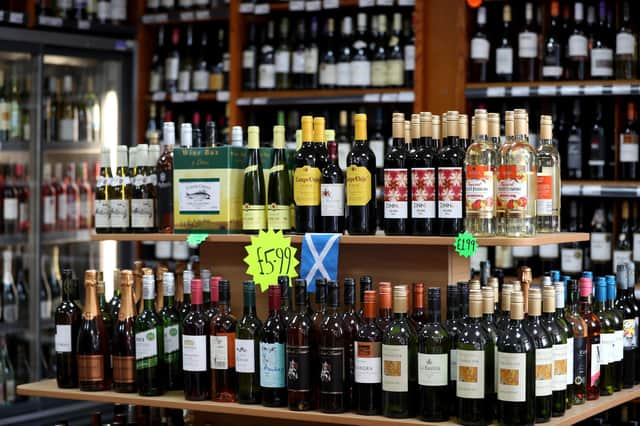Study hailed as ‘powerful evidence’ that minimum alcohol pricing in Scotland reduces harm


Scotland became the first country in the world to bring in minimum unit pricing (MUP) for alcohol in May 2018, with it currently fixed by the Scottish Government at 50p per unit.
Researchers found alcohol sales in Scotland fell by 7.7% after the policy was brought in, when compared with the north east of England.
Advertisement
Hide AdAdvertisement
Hide AdIn Wales, which introduced minimum pricing almost two years after Scotland in March 2020, there was an 8.6% decrease in sales when compared with the west of England.
The research, led by Newcastle University and published in the Lancet Public Health, found: “For both Scotland and Wales, reductions in overall purchases of alcohol were largely restricted to households that bought the most alcohol.”
It concluded MUP “is an effective alcohol policy option to reduce off-trade purchases of alcohol and should be widely considered”.
The study looked at data detailing more than 1.24 million separate alcohol sales between 2015 and 2018, and also in the first half of 2020 – with this period covering purchases by 35,000 households.
According to the research, the impact of MUP was mainly seen in households that buy the most alcohol.
However the exception to this was those in high-purchasing, low-income homes, who did not seem to change their habits.
One of the study’s authors, Professor Eileen Kaner from Newcastle University, who is also director of the Applied Research Collaboration North East and North Cumbria, said it was a “concern” those households did not adjust their buying habits, and “spending simply increased as a result of the MUP policy”.
She said: “This is something that we want to explore further so we can better understand the reasons behind this, as well as its impact.”
Advertisement
Hide AdAdvertisement
Hide AdOverall, Professor Peter Anderson, from Newcastle University who led the research, said the findings show “the introduction of a MUP in Scotland has made a significant impact on reducing alcohol levels, with a sustained drop in overall units bought by some of the highest-consuming households two years on”.
He added: “We can now see that the introduction of a MUP in Wales at the beginning of March 2020 has had a similar impact to the one we saw in Scotland in 2018 and we hope to see a continued benefit.
“This is an important step forwards in addressing high levels of alcohol-related health problems and social harm that is caused by too much alcohol consumption.”
Professor Sir Ian Gilmore, chair of the Alcohol Health Alliance, said: “This is powerful, real-world evidence of the success of minimum unit pricing as a harm reduction policy.”
He called on the UK Government to follow the lead of the devolved administrations in Scotland and Wales and introduce minimum pricing for England.
Sir Ian said: “Westminster has said time and time again that it is waiting for evidence from Scotland and Wales on minimum unit pricing, meanwhile 80 people a day are dying from an alcohol-related cause.
“The evidence is here – it’s time for the Government to introduce minimum unit pricing in England in order to save lives, cut crime and reduce pressure on our NHS and emergency services.”
Alison Douglas, chief executive of Alcohol Focus Scotland, described the research as “hugely encouraging”.
Advertisement
Hide AdAdvertisement
Hide AdShe said: “Not only is MUP continuing to have the intended effect in reducing overall alcohol consumption in Scotland, it is those that tended to buy the most alcohol who are most likely to reduce the amount they purchase.
“Alongside this, we are seeing early signs that this reduction in consumption may be beginning to translate into wider improvements in health, with a reduction of 10% in alcohol-specific deaths in the first year of MUP.”
However she said the current 50p minimum unit price had been “significantly eroded by inflation” since it was initially set in 2012, with the introduction of the policy delayed by a lengthy legal challenge after that.
Ms Douglas urged the Scottish Government: “Now is the time to increase the minimum price to not only account for inflation, but also set it at a level that will save more lives and prevent a new generation from developing a problematic relationship with alcohol.
“The Scottish Government should look to increase the minimum unit price to at least 65p per unit and to future-proof its positive effects and ensure that the price is increased in line with inflation.”
A message from the Editor:
Thank you for reading this article. We're more reliant on your support than ever as the shift in consumer habits brought about by coronavirus impacts our advertisers.
If you haven't already, please consider supporting our trusted, fact-checked journalism by taking out a digital subscription.
